Suicide is often used by pro-natalists to counter antinatalism. The issue is usually brought up in three different ways. The most common mention of suicide is one of various verbal vomits such as ‘if you think life is so bad why don’t you kill yourself’. I will not discuss this specific use of suicide in the following text, not only because it’s ignorant and idiotic, but mainly since this “argument” is so detached from any antinatalist argument that it is not even relevant to refute it. It simply has nothing to do with antinatalism. Therefore as common as this stupid evasion is, I’ll skip it and focus on the other two.
The second one is an attempt to refute the antinatalist claim that procreation is morally wrong since life is a harm, by stating that only a tiny minority of people carry out suicide, therefore procreation is not a harm and life is not as horrible as antinatalists claim it is.
The third one is an attempt to suggest a solution – if life is so horrible for a person, suicide is always an option. Although this claim is often used in a cynical manner, it can also be seriously used as a counter argument for antinatalism and so despite that it is giving it more credit than it actually deserves, this is how I’ll address it here.
A Wrong Use of the Wrong Statistics
Pro-natalists claim that antinatalism is wrong since only a tiny minority of people feel that their lives are not worth living, evidently very few people carry out suicide. This claim is false from several aspects, first of all factually.
Officially, more than one million people worldwide kill themselves every year. That means that statistically, for every 130 people born each year, one will carry out suicide. Globally, suicide ranks among the three leading causes of death among those aged 15–44 years, and the 2nd leading cause of death in the world for those aged 15-24 years. In most countries the incidence of suicides is higher than the incidence of intentional homicides. In the United States there are more than twice as many suicides as there are homicides. A report by the World Health Organization states that more people take their own lives every year, than those murdered or killed in war.
According to recent findings from the Center for Disease Control and Prevention, over the past 20 years, suicide rates have been on the rise in every state in the US except Nevada. The research found that the suicide rate increased by more than 30% in half of the states from 1999 to 2016. In some states, that increase was as high as 58%.
The World Health Organization states that a person carries out suicide somewhere in the world every 40 seconds.
And all these are official statistics, unofficially the numbers are even higher as many deaths are not considered suicides but as accidents or unsolved mystery and etc., to avoid the associated public shame, or family guilt.
However, the more important point is not what the real scale of suicide is, but is it the real scale for life evaluation. It is not. Suicide statistics don’t reflect the number of people who feel that their lives are not worth living. If anything, it is suicide attempts which are much more indicative, and the statistics are that there is one death by suicide for every 25 attempts. So all the former statistics, as alarming as they must be to anyone who thinks this pro-natalist claim is reasonable in the first place, must be multiplied by 25.
But even that extent is very partial and misleading since trying to carry out suicide is extremely difficult, and from many different aspects. The first and most primal one is that it is biologically difficult. Many people don’t carry out suicide because they are built to survive. As horrible as life is for someone, to intentionally end it by oneself, one must overpower the very strong biological instinct of self-preservation. Almost every biological mechanism in our body is built to survive, including the innate fear of pain, height, being under water, blood, suffocation and etc. and suicide often involves at least one of them.
People are biologically wired to survive, and that doesn’t change even when they are living in complete misery. We have evolved to survive, not to kill ourselves, so to try it anyway, one must overpower strong primal forces, and this is only the beginning of the suicide ordeal.
Another obstacle to overcome is a social one. The social status of suicide is that it is wrong, cowardly and even a sin. People are indoctrinated from age zero to believe that life is precious, a sacred gift one must cherish. Of course, one can wonder, if life was really a gift then why almost each and every society and religion feel the need to condemn suicide as sin, as a sign of weakness and ingratitude? Why do they all fight the suicide option and insist on forcing life on people instead of letting them decide if they want to use this “gift” or not? Why not making suicide legal and legitimate? Isn’t it suspicious that life is constantly praised and death constantly condemned? When so many people are making so much effort to prove something which is supposed to be so obvious, it means that it is not so obvious that it is so obvious.
However, having said that, it is not easy to overcome this intensive indoctrination. In addition to the inner constraints, the fact that a suicide attempt usually carries a social stigma deters many from trying. If the veil of social shame is removed, and if no religion institute considered it a sin (which is a very important factor to many people), clearly many more people would have carried out suicide.
Another obstacle is jurisdictional. It may sound relatively minor, however, in many places in the world, people are afraid that in the case of failing, they would be coercively hospitalized in a psychiatric hospital.
Another jurisdictionally important factor is that it is illegal to assist suicide. Many find it hard to kill themselves by themselves but would do it easily if they were assisted. It is not accidental that assisting another person to carry out suicide is a crime. If it wasn’t, probably many more people would use the assistance of others and do it.
Another serious obstacle to overcome is the fear of death. It may sound counterintuitive but it is not that people who consider suicide want to die, it’s that they don’t want to live. They can fantasize daily about ending their life and at the same time fear death and the unknown. The fear of death, even among the ones who wish for the ending of their lives, is instinctive, everyone is biologically built to fear death. And since not everyone view death as the end of all experiences, many are also conceptually afraid of it. Afraid of the unknown. In my view, death is not a state of unknown experiences, but of no experiences whatsoever, however the point here is not about how death feels like for the one who died (which is a morally irrelevant question as the dead don’t experience anything anymore including their own death), but how death feels like for the one who lives (which is a morally relevant question, since the living do have experiences regarding death as long as they are alive), and for many this experience is fear. And it is this fear of death, not the love of life, which prevents many people from killing themselves.
So, many people don’t carry out suicide because they are scared to die, and many don’t carry out suicide because they are scared not to die (if they fail). To fear a failed suicide attempt is also a very serious obstacle. Some people have survived jumping off high buildings, ending up in an even more horrible situation. Same goes for jumping off bridges, as in many cases their bodies have triggered survival instincts which made them try and swim up for air, until they were found by the coast guards. Some people survive overdoses if they haven’t swallowed the right pills or the right amount of them. Same goes for self-poisoning.
The fear of a severe disability or any other medical damage as a result of a suicide attempt, detains many who fear that they might end up even worse than they were.
Some people are halted by a personal obstacle in the form of obligations to others such as their children or other family members who are dependent on them. Many people reach the conclusion that their lives are not worth living after having children and so are trapped in life. This is, at least partly, why young people who don’t have children yet, and old people whom their children are old enough to take care of themselves, carry out suicide in much higher rates than people in the ages of 29 to 50.
Another major obstacle is guilt. Many people really want to end their life, but don’t want to hurt the people who care about them. People tend to blame themselves for the suicide of close ones, and people who contemplate suicide know that. They also know that people who carried out suicide are blamed for being selfish. And they don’t want that either.
Many are concerned that their close ones might find their body or that if they would make sure it would be hard to find their body, it would make people who care about them extremely worried until it would be found.
And finally, seemingly merely a technical obstacle but actually of the most important ones, is the lack of easy access to fast, safe and painless methods of suicide.
One of the reasons that men successfully carry out suicide about four times more often than women is gun ownership. Where methods which women usually prefer are available, for example ingestible lethal poisons in China and India, female suicide rates are similar and sometimes exceed that of men. That means that when people have access to a reliably lethal method, they are far more likely to kill themselves. Or in other words, if reliably lethal methods were more available, suicide rates were much higher.
In her book Night Falls Fast: Understanding Suicide, Kay Jamison lists some horrible suicide methods performed by people who didn’t have access to more convenient options:
“To kill themselves, the suicidal have jumped into volcanoes; starved themselves to death; thrust rumps of turkeys down their throats; swallowed dynamite, hot coals, underwear, or bed clothing; strangled themselves with their own hair; used electric drills to bore holes into their brains; walked off into the snow with no provisions and little clothing; placed their necks in vices; arranged for their own decapitation; and injected into themselves every substance known to man, including air, peanut butter, poison, mercury, and mayonnaise. They have flown bombers into mountains, applied black widow spiders to their skin, drowned in vats of beer or vinegar, and suffocated themselves in their refrigerators or hope chests. One of Karl Menninger’s patients tried repeatedly to kill himself by drinking raw hydrochloric acid; he survived those attempts and died only after swallowing lighted firecrackers.” (p.133)
This list goes to show that for many people their existence is so horrible that they preferred to go through these horrible ways of dying and not through life. And who knows how many people had to suffer horrible lives because they couldn’t put themselves through any of these horrible methods and didn’t have alternatives. Had they had any, the suicide rates were much higher. And that is the case today just as much. If the most convenient suicide methods, for example a drug overdose of soporifics, were highly available, many more would have killed themselves.
People often say that gun ownership increases the risk of suicide as firearms account for about half of all suicides in the United States. But clearly this data is presented falsely. Gun ownership doesn’t incite a will to die, but an easy way to actualize it. The will to die is incited by life.
This data shows that if everyone had a gun many people would have chosen to use it to end their own misery. And that is despite that killing oneself with a shot to the head is not a very inviting option. If there was a pill which anyone could purchase at any drugstore with no prescription, which painlessly and surely kills during sleep, the suicide rates would skyrocket.
This is a very partial list of the suicide ordeal. There are many more factors and there is definitely much more to say about each of the mentioned ones. But I guess it is sufficient for claiming that suicide is very difficult physically, mentally and emotionally. And yet, every year, tens of millions of people are trying to do it anyway. This fact, especially considering all these obstacles and many more, is a proof of how horrible life is, not the other way around.
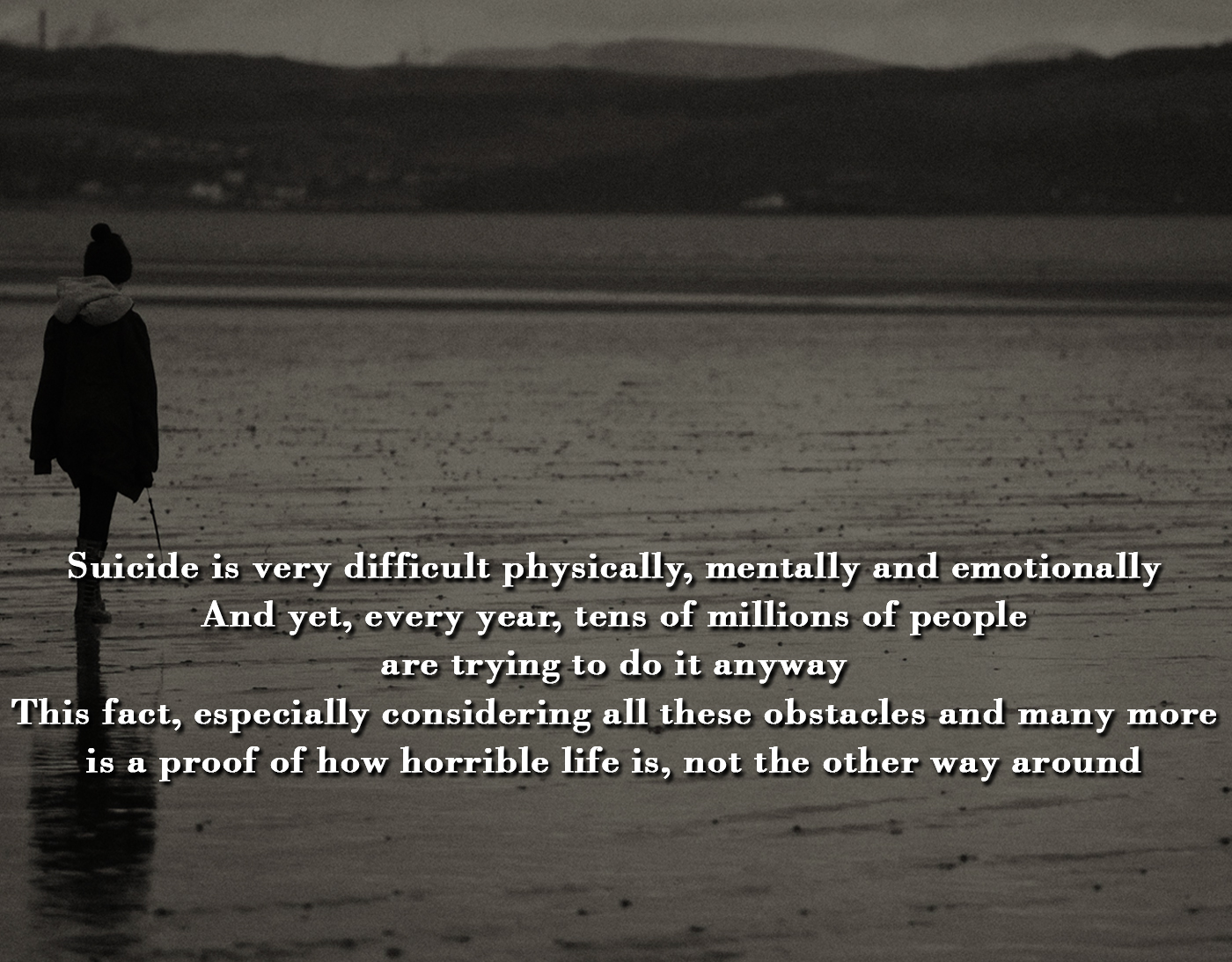
But the even more important point for that matter is that all these obstacles, by preventing millions of people from trying to kill themselves, conceal the true number of people who feel that their lives are not worth living. Since trying to kill oneself is so difficult, it would be much more accurate to consider how many have thought about it. The question in point is not how many people have killed themselves, or how many have tried to, but how many wanted to.
Based on data from the 2017 National Survey on Drug Use and Health (NSDUH) by the Substance Abuse and Mental Health Services Administration (SAMHSA), the prevalence of serious suicidal thoughts among adults aged 18-25 is 10.5%.
The CDC estimates that about 10 million American adults seriously contemplated ending their life, nearly 3 million made a suicide plan, and 1.3 million attempted suicide.
A comprehensive study of suicidal thinking among college students in the United States found that more than half of the 26,000 surveyed had suicidal thoughts at some point during their lifetime.
The web-based survey conducted in spring 2006 used separate samples of undergraduate and graduate students from 70 colleges and universities across the country. Of the 15,010 undergraduates, average age 22, 55 percent had ever thought of suicide; 18 percent seriously considered it; and 8 percent made an attempt. Among 11,441 graduate students, average age 30: Exactly half had such thoughts; 15 percent seriously considered it and 6 percent made an attempt.
A more recent and extensive study that surveyed more than 67,000 students in the United States, found that over 20 percent of the students had suicidal thoughts or attempts just in the passing year. Furthermore, 9 percent had attempted suicide, and nearly 20 percent have deliberately injured themselves.
A study among students in grades 9-12, also in United States, has found that 17% of students seriously considered attempting suicide in the previous year. 13.6% of students made a plan about how they would attempt suicide in the previous year. 8% of students attempted suicide one or more times in the previous year. And 2.7% of students made a suicide attempt that resulted in an injury, poisoning, or an overdose that required medical attention.
Other researches, conducted in Europe and Africa as well as in the United States, have shown that mild to severe thoughts of suicide are common, occurring in 20 to 65 percent of college students.
In the earlier mentioned book Night Falls Fast: Understanding Suicide various surveys regarding suicide are detailed. All of them are a bit dated (the book was published in 1999) but since the figures have only gone up since then, many are still relevant and insightful. Here are several of them:
“Twenty-five years ago, in an early community-based study of suicidal thinking and behaviors, University of Cambridge psychiatrist Gene Paykel and his colleagues interviewed more than 700 people in New Haven, Connecticut. The results gave a public face to what had been very private thoughts. More than 10 percent of those interviewed said that, at some point in their lives, they had felt that “life was not worth living,” and a comparable number said that they had, at one time or another, “wished they were dead.” One person in twenty had thought about actually taking his or her own life, and most of those who had thought about suicide had thought about it seriously. One person in a hundred said he or she had attempted suicide. Approximately twenty years ago, the National Institute of Mental Health began the largest study ever undertaken of the nature and extent of psychiatric disorders in the U.S. population. It involved extensive interviews of a total of 20,000 people living in the five American catchment areas of Baltimore, Maryland; Piedmont County, North Carolina; Los Angeles, California; New Haven, Connecticut; and St. Louis, Missouri. The study included four questions about suicide, similar to those asked by Paykel and his colleagues, but was more specific in that it required a minimal duration for suicidal thoughts of two weeks. Of the 18,500 individuals who responded to the questions about suicide, 11 percent said they had at some point during their lives felt so low they had thought of committing suicide; 3 percent of the total said they had made one or more suicide attempts. Other investigations conducted in general communities have found that, consistent with these two studies, between 5 and 15 percent of the general adult population acknowledge having had suicidal thoughts at some point in their lives.
Two other studies of American high school students confirmed that thinking about suicide is far from a rare concern: more than 50 percent of New York high school students reported that they had “thought about killing themselves,” and 20 percent of Oregon high school students described a history of suicidal thinking of varying degrees of severity.” (p.35)
Suicide statistics are much higher than pro-natalists want to believe, and they increase along the years. They are also only partial. We don’t need to examine the number of suicides or suicide attempts, but the number of people who seriously wanted to die, of people who contemplate suicide. And that is a very high percentage.
And even more important than how many people are currently contemplating suicide, is how many would have, had all the obstacles mentioned before been removed. Obviously it is impossible to estimate this figure, but if suicidal figures are at all necessary to constitute an antinatalist argument (a claim which I disagree with but go with it for the sake of the argument), this is the figure to work with.
Pro-natalists find it much easier to consider “only” suicides (and reduce even their true scope), and to ignore suicide attempts, and suicide thoughts. But the question is how many would rather not live, not how many can overcome every obstacle in the suicide ordeal. It is easier for them since they know that the answer to that question, the answer to the right one, doesn’t reinforce pro-natalism but exactly the opposite.
Many people don’t carry out suicide not because life is a gift, but because ending it is a serious burden and from many different aspects. If all the preventable obstacles were omitted, the relatively high rate of suicide, suicide attempts, and suicidal thoughts, would have been much much higher.
Not that it is necessary in order to constitute an antinatalist argument, as even if it was truly a tiny minority it would have been sufficient, but it is currently not a tiny minority, and there would be many more people who would carry out suicide hadn’t there been so many obstacles. This is the real figure. Not how many did, or how many tried, and not even how many thought about it, but how many would have thought about ending their lives had all the obstacles been removed. Then we would have had a more accurate reflection of how horrible life is. Not a precious gift but a monstrous burden which is very difficult to get rid of.
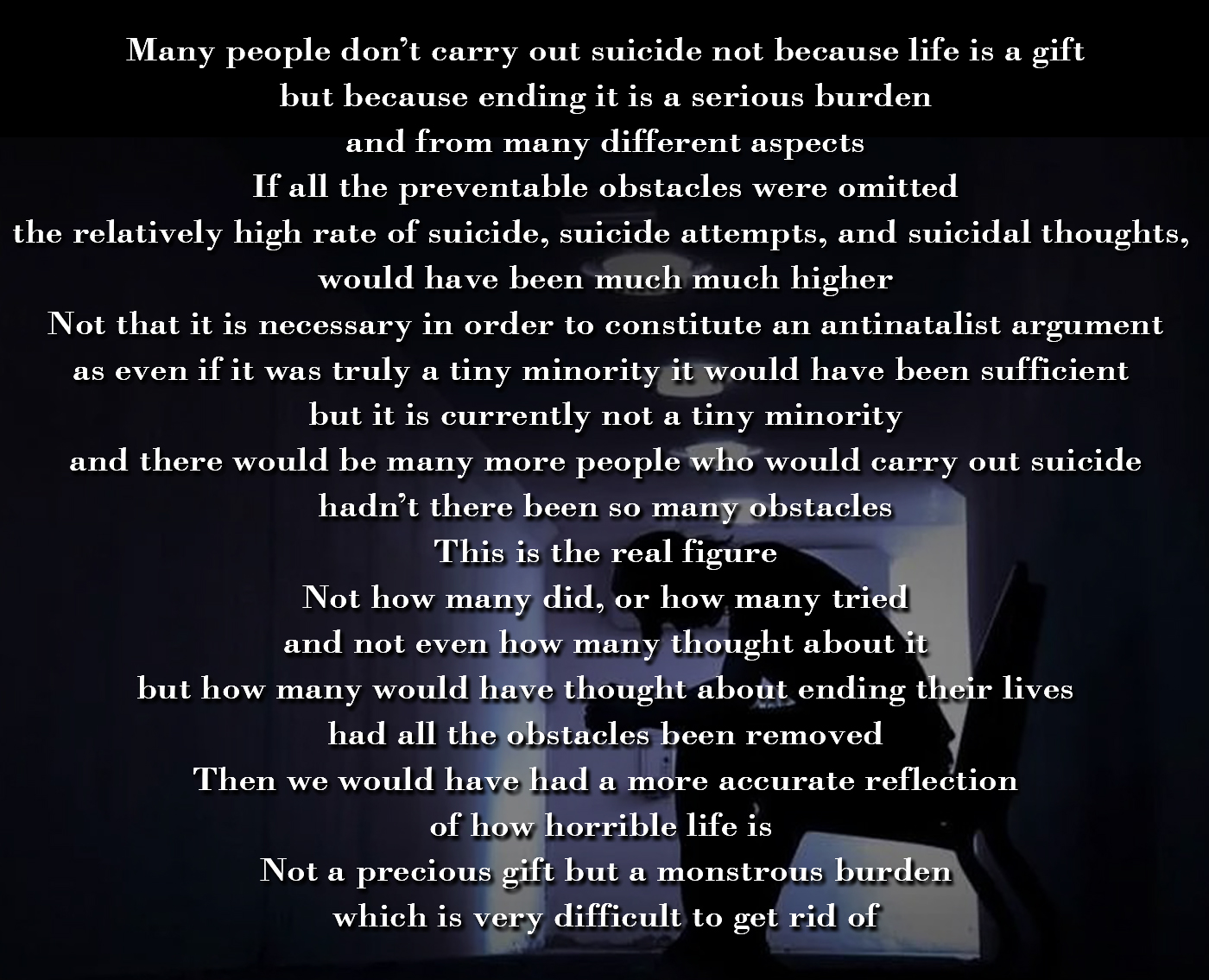
Cruel Trap
The third pro-natalist use of suicide – that the option to kill oneself is always available for anyone who has ‘a problem with life’– was actually already proven false in the former part of this text. Every obstacle mentioned, and others that weren’t, don’t only prove that the current suicide scale is not at all indicative of the number of people whom their lives are not worth living, it also proves that suicide is not really an option for people who feel that way.
Even people who really suffer in life are usually afraid of death, of pain, of permanently disabling themselves if they don’t succeed, of committing a sin, of their family, of the unknown, of breaking the law, of being socially shamed, of being blamed for selfishness, of the isolation ward in a psychiatric hospital. So the suicide option is not very tempting in the better case, and nonviable in the worst.
For suicide to really be an option societies must adopt a right to die, with no committees, no investigations, and no forms to fill besides a formal application, and with assistance to anyone who wishes to die. Not only that suicide must be legal, it should be easy, highly accessible, painless, cheap and risk free. And even all that, which is currently exactly the opposite of the way society view suicide, is far from being enough to argue that anyone who thinks life is not worth living can simply carry out suicide.
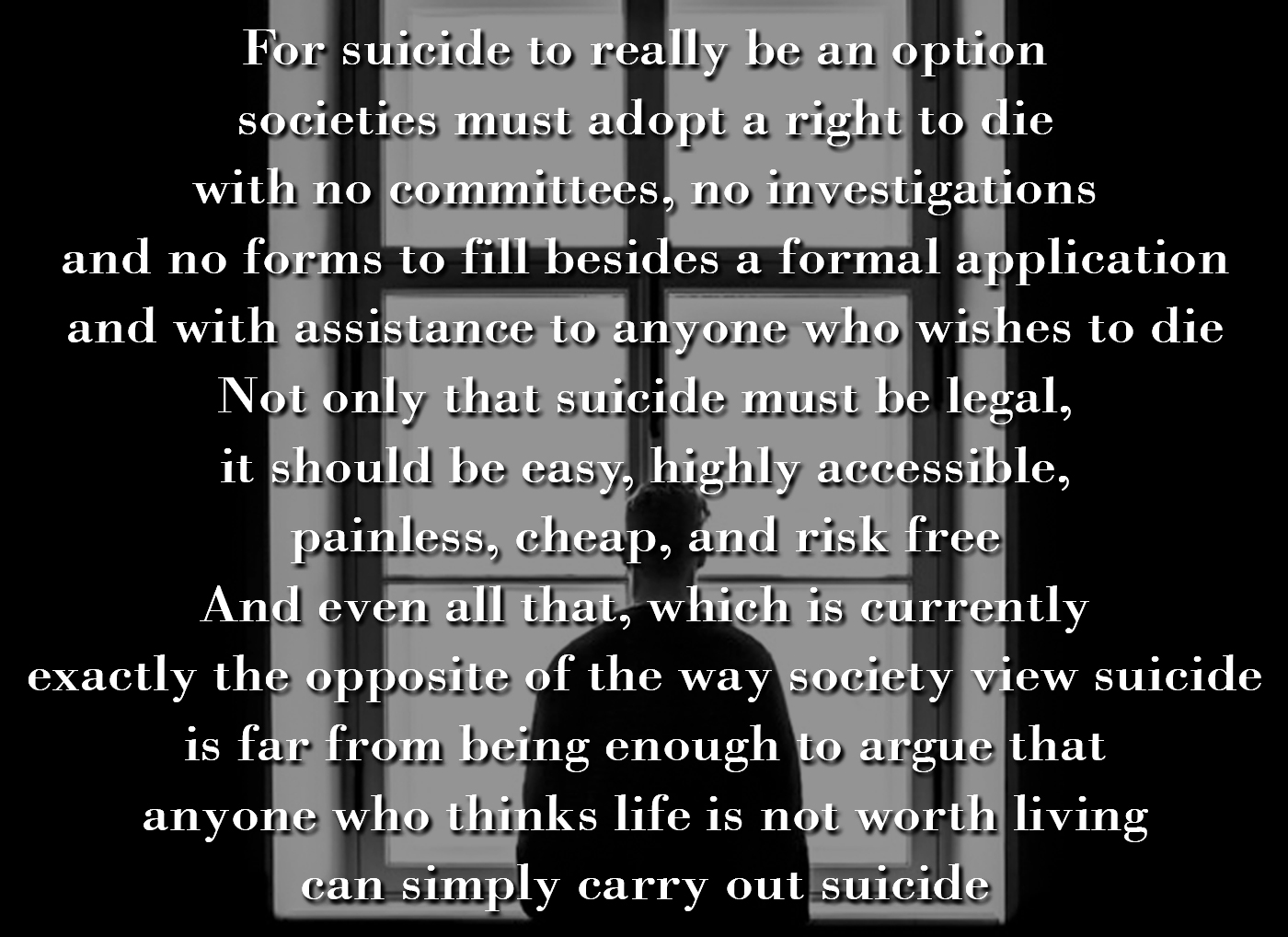
It is false from every perspective to present suicide as a legitimate option available to anyone at any time. Biologically, suicide is the last option. And the fact that people are biologically built to survive, doesn’t soothe individuals whose lives are not worth living in their eyes, but exactly the opposite. They are prisoners of their own biological mechanisms. They are life’s captives, not free spirits who can choose to end their lives whenever and however they wish. People are trapped in horrible lives without a truly viable option to end it. They are built to stay even though their lives are bad.
People have no serious exit option that can justify their forced entry. Not that if there was any, procreation was morally justifiable, but at least this argument was decent and coherent. But there isn’t so it is not. People must overcome too many obstacles with each being too difficult, for suicide to really be an option.
It is very easy for pro-natalists to “solve” the issue by suggesting the suicide option, but it is not as if suicide is really perceived socially as a legitimate option. In fact it is exactly the opposite.
Suicide is perceived as an irrational choice, if not as a psychological indication of insanity (under harsher medical regulations), and never as a rational option anyone can choose, as it is falsely presented in this argument.
The fact that assisting suicide is illegal, and that the most convenient suicide methods are illegal and very inaccessible, also testify as to how far suicide is from being a legitimate option for people who want to end their lives.
If the ‘suicide is always an option’ justification for forcing life without consent was genuine, its advocators would also be advocators of making suicide more accessible, acceptable and easier. But they don’t, since obviously it is not genuine but merely a lame and lazy excuse for their selfish desire to procreate.
Most parents deceive and excuse themselves by saying that it won’t happen to their children. But it does. This claim implies that all the parents of all the people who have carried out suicide did a bad job as parents, which of course is not necessarily true. Many things are not under the control of parents (for example, there is not a lot that parents can do about mental diseases, or deep depression, which in many cases lead to suicide). The parents of people who have carried out suicide or a suicide attempt, are not necessarily worse than any other parent and they haven’t necessarily done something wrong as parents. They have definitely done something very wrong as people, which is creating persons who want to kill themselves, but this is not necessarily a result of them being worse parents than any other parent, since it can happen to anyone, and therefore no one should procreate.
No one should take the risk that their children would suffer so much that they would not only want to die, but that they would overcome all the obstacles and try to do something about it, or won’t because they are too afraid, or because they care too much about the people who care about them.
No one should put anyone in such a horrible position where they don’t want to live but are trapped in life.
Tens of millions of people are forced to live day after day after day, feeling that they don’t want to live, but are afraid of carrying out suicide, or that they are even in a deeper trap, can’t stand living but can’t stand the thought of hurting others by killing themselves. This is the cruel trap many people are forced to endure because they were brought to life. The option of suicide is not a legitimate solution for the problem of procreation, but in fact another of its many evils. Suicide is not a viable solution, and even if it was, it cannot compensate anyone for the suffering of existence, but can only stop the continuance of the suffering of existence. It can’t retroactively justify the existence of someone who doesn’t want to live, or wishes s/he had never existed. The suffering of these people can never be compensated nor justified, even if suicide was fast, fearless, absolutely sure, plain, painless and harmless to others. And it is definitely not the case when it is none of the above. Suicide is always difficult and rarely unharmful to people who knew the person carrying it out.
To seriously suggest the suicide option as if it is plain, harmless and viable for anyone, is not naïve, but stupid, ignorant and cruel.
Since so many people are so deterred by the thought of hurting so severely people who care about them, and so are trapped in life, if it was possible to carry out suicide by pressing a button that immediately totally erases the existence of these people, so that no one who ever knew them even remember their existence, then suicide could have been suggested more seriously as an option. But if this option was viable the number of suicides was enormous.
The reasons why not many more people are carrying out suicides is not that life is a gift but because of biological, psychological, emotional and even juridical difficulties.
Not only that hundreds of millions of people were forced to live lives they don’t want, and without their consent, they are forced to keep living them because they don’t want or are afraid to kill themselves for any of the mentioned reasons.
Trapping people in the impossible situation of not wanting to live but not wanting to kill themselves, for example, so not to hurt others, is not a solution, but an additional problem of procreation. It is a very cruel trap which the only way to avoid it is by not creating more persons.
However, people are ready to take the risk that their own children would end up in this cruel trap rather than giving up procreation. This is how cruel most people are. And that’s why it is pointless to show them the cruel trap they are creating for their own children, hoping they would choose to avoid it, and why it is so essential to try and break these cruel traps ourselves.
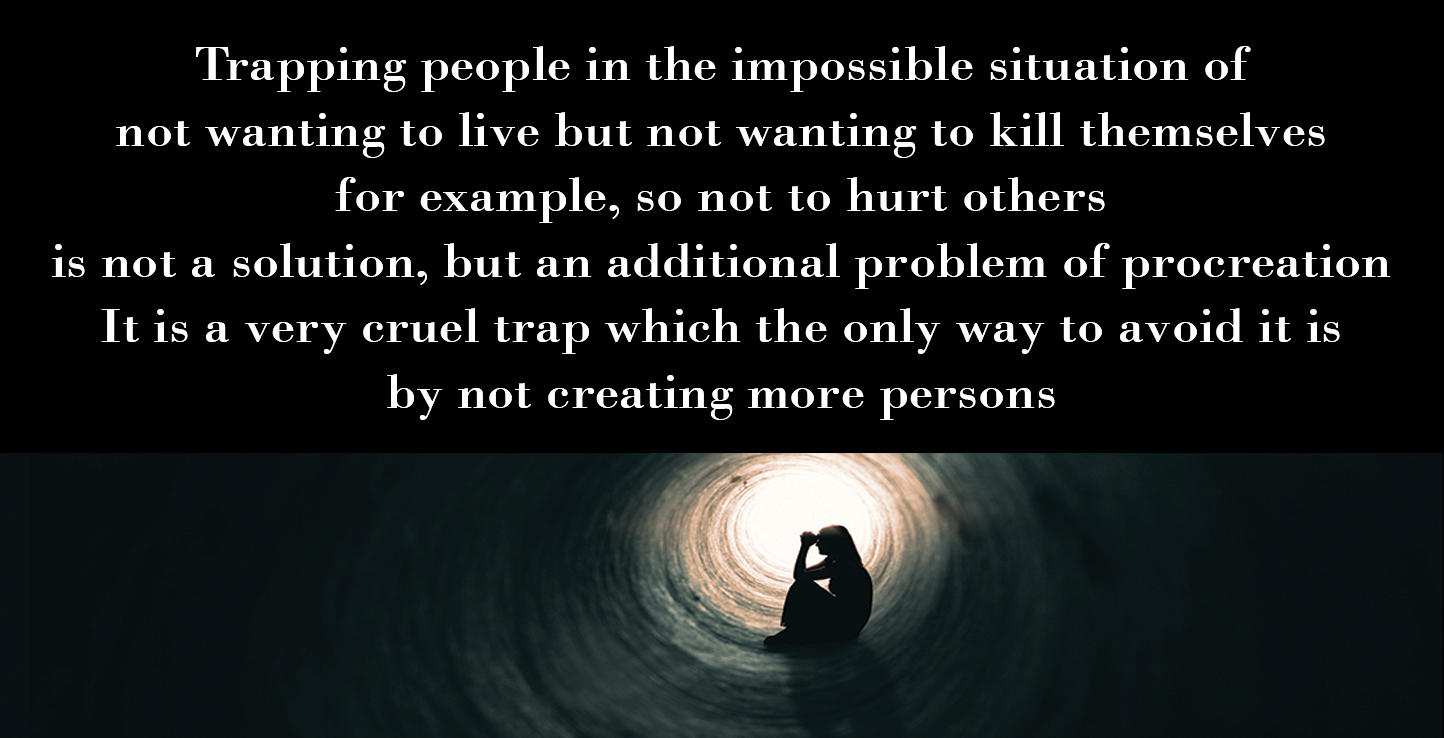
References
American Foundation for Suicide Prevention www.afsp.org
Cabrera Julio, A Critique of Affirmative Morality: a reflection on death, birth and the value of life
(Brasília: Julio Cabrera Editions 2014)
Cabrera Julio, Negative-Ethics 2011
https://philosopherjuliocabrera.blogspot.com/2011/05/negative-ethics.html
Cavan Shonle Ruth The Wish Never To Have Been Born (American Journal of Sociology Volume 37, 1932)
David Benatar, Better Never to Have Been (Oxford: Oxford University Press, 2006)
Jamison, Kay R, Night Falls Fast, Understanding Suicide (Vintage 2000)
Kann L, Kinchen S, Shanklin SL, et al. Youth Risk Behavior Surveillance — United States, 2013. MMWR 2014; 63(ss04): 1-168. Available from http://www.cdc.gov/mmwr/preview/mmwrhtml/ss6304a1.htm
Nature of Suicidal Crises in College Students http://www.cmhc.utexas.edu/rc_project5.html
Parks SE, Johnson LL, McDaniel DD, Gladden M. Surveillance for Violent Deaths– National Violent Death Reporting System, 16 states, 2010. MMWR 2014; 63(ss01): 1-33. Available from http://www.cdc.gov/mmwr/preview/mmwrhtml/ss6301a1.htm
Sarah Perry Every Cradle Is a Grave: Rethinking the Ethics of Birth and Suicide
(Nine-Banded Books 2014)
Silverman, M., Meyer, P., Sloane, F., Raffel, M., & Pratt, D. (1997). The Big Ten student suicide study. Suicide and Life Threatening Behavior, 27, 285–303
http://onlinelibrary.wiley.com/doi/10.1111/j.1943–278X.1997.tb00411.x/abstract
Substance Abuse and Mental Health Services Administration, Results from the 2013 National Survey on Drug Use and Health: Mental Health Findings, NSDUH Series H-49, HHS Publication No. (SMA) 14-4887. Rockville, MD: Substance Abuse and Mental Health Services, 2014. Available at http://www.samhsa.gov/data/sites/default/files/NSDUHmhfr2013/NSDUHmhfr2013.pdf
Sullivan EM, Annest JL, Luo F, Simon TR, Dahlberg LL. Suicide Among Adults Aged 35-36 Years – United States, 1999-2010. MMWR 2013; 62(17): 321-325. Available from http://www.cdc.gov/mmwr/preview/mmwrhtml/mm6217a1.htm
Suicide Prevention Resource Center www.sprc.org
https://www.sprc.org/sites/default/files/Handout-DataAboutSuicidalBehaviorAmongCollegeandUniversityStudents.pdf
https://www.webmd.com/depression/news/20180910/1-in-5-college-students-stressed-consider-suicide
http://www.vhemt.org/suicide.htm
https://www.save.org/about-suicide/suicide-facts
Web-based Injury Statistics Query and Reporting System (WISQARS) [Online]. (2013, 2011) National Center for Injury Prevention and Control, CDC (producer). Available from http://www.cdc.gov/injury/wisqars/index.html

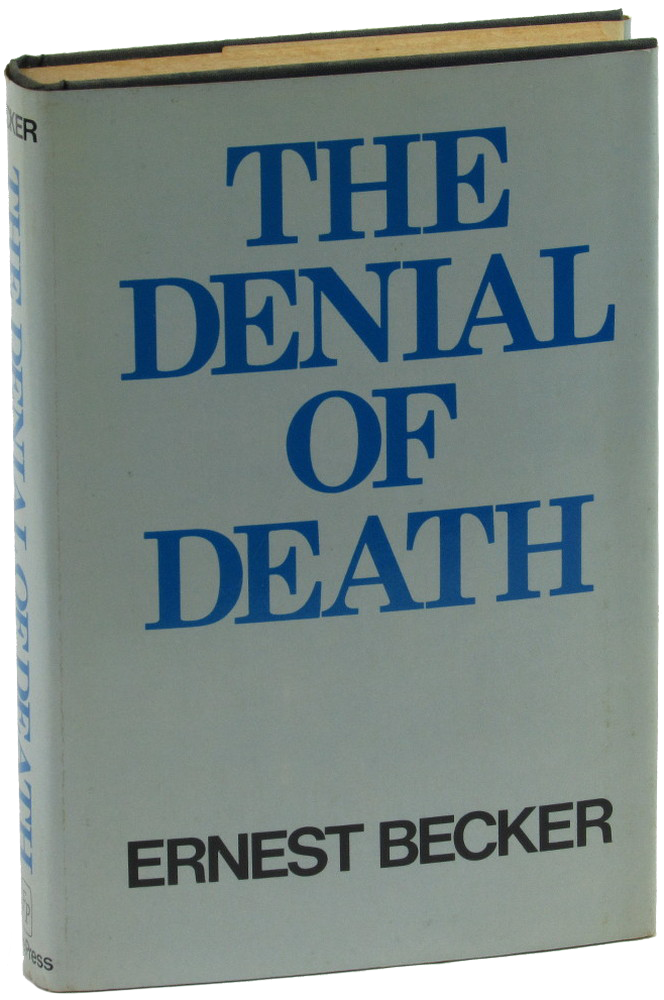
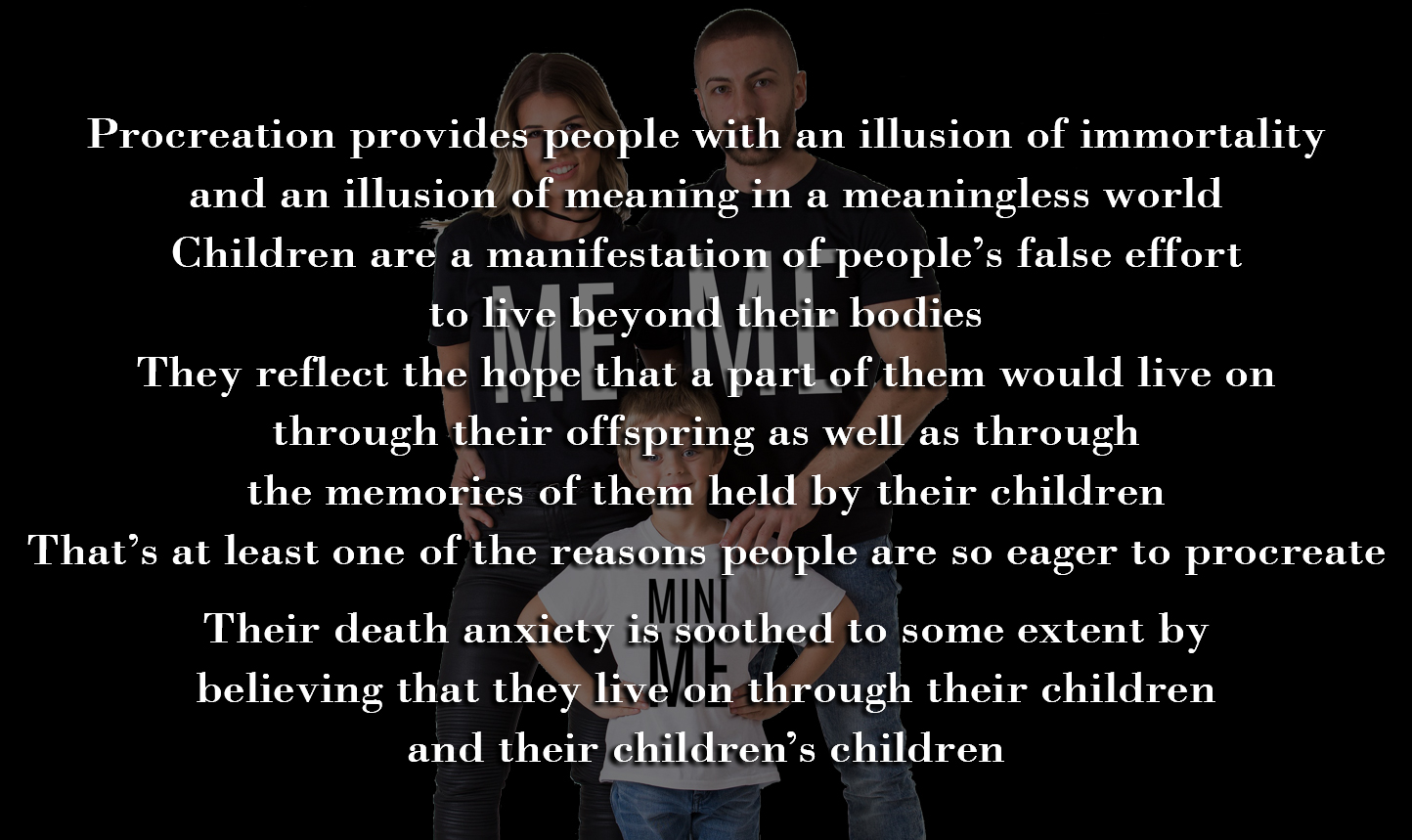

















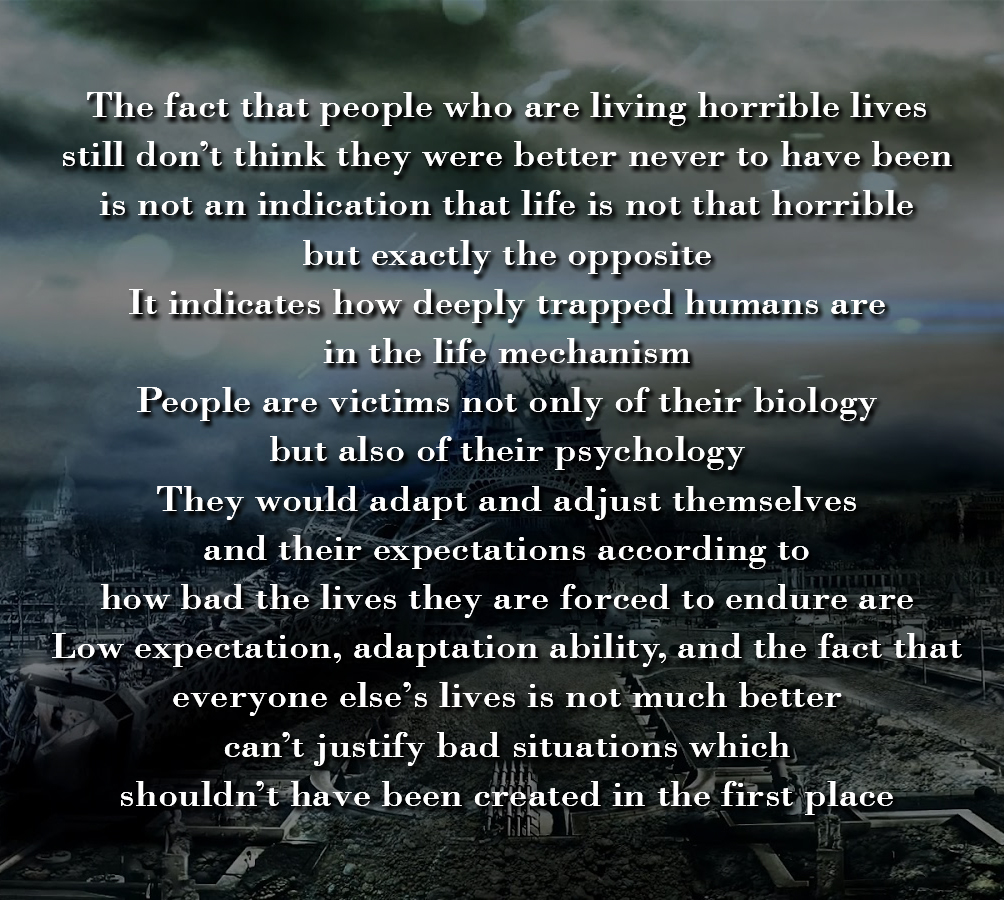
Recent Comments